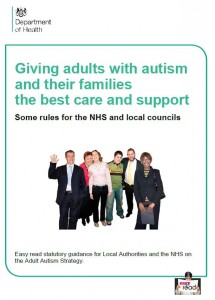Last November, I encouraged social workers, educators and anyone involved in supporting vulnerable individuals and families to take part in the Autism Statutory Guidance consultation. I cannot emphasise enough how important it is to me to see the values and expertise of social workers reflected in this and other engagement exercises - the outcomes of which are designed to benefit those we seek to help.
 How health and social care services respond to the complex needs of people with autism and other cognitive conditions can make the difference between a life well lived and a life unfulfilled.
How health and social care services respond to the complex needs of people with autism and other cognitive conditions can make the difference between a life well lived and a life unfulfilled.
The revised guidance published today is mindful of this and encourages local authorities, commissioners and service providers to reach out to community networks, making sure information and access to support is clearly signposted for those who need it.
The guidance also places welcome emphasis on the sector’s obligation to provide appropriate training for those working with people with autism.
Regular readers of my blog will be aware that this department has commissioned The College of Social Work to develop a Continuing Professional Development curriculum guide on autism linked to the Professional Capability Framework. This work has already been informed by my own recently published Knowledge and Skills Statement which seeks to equip social workers with the tools they need to best serve the interests of individuals and families, including those with autism. It is important that when a person is being assessed there is awareness of their autism and the impact it has on them, their family or carers.
Equally welcome is the directive that adults with autism, their families, carers and advocates must be involved in commissioning processes – and in the planning of staff training. It makes complete sense to me for their views to be included as part of any development process - and for them to have the opportunity to explain to service commissioners and providers how autism affects them.
The extension of choice is also made clear in the guidance and, to this end, references the Children and Families Act 2014 which provides for a special educational needs and disability support system, covering education, health and social care. The guidance makes clear that young people seeking additional support can ask local authorities to assess their educational, health and care needs. Schools, colleges and others tasked with their care can also make requests on their behalf.
Finally, there is clear direction on obligations for local health and care services to manage transitions from child to adulthood as smoothly as possible. All too often, as social workers, we see young adults struggle to cope because there is no continuance of appropriate care once they leave the education system. We see this in mental health services too – another area I am pleased to see being addressed in other initiatives – but it is no less true for people with autism. That’s why we need to listen harder than ever to the needs and worries of those leaving childhood behind but needing on-going support to make the most of adult life.
As social workers, educators and service commissioners, I urge you to read this guidance and refer to it in all situations where you may be contributing to - or influencing decisions about - the care and support needs of people with autism. As with many recent initiatives this is about respecting people’s rights and making sure they are fully aware of the support available. It comes back to our role as advocates – in both a formal and informal context. We’re already good listeners and facilitators – this guidance is another way to make us even better at both.
Leave a comment